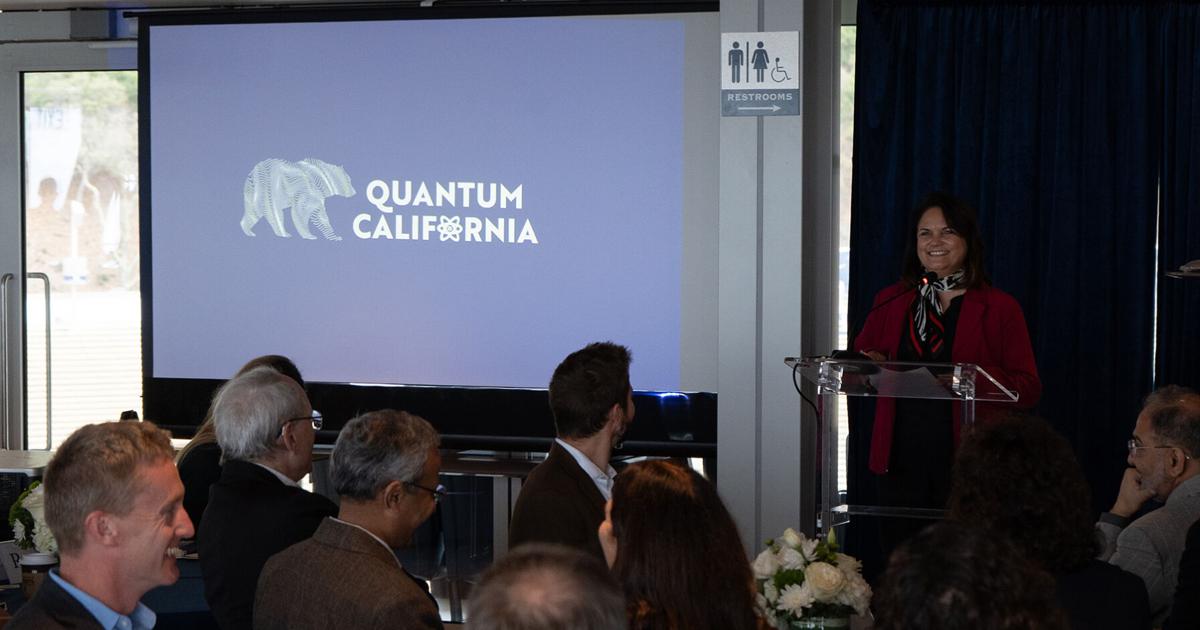Leaders and researchers in the quantum industry gathered at UC Berkeley’s California Memorial Stadium on Friday morning to launch Quantum California, a statewide private-public initiative to connect labs, universities, businesses and communities to advance California’s position in the quantum industry, according to Gov. Gavin Newsom in a video played at the event.
The initiative follows Newsom’s Oct. 3 signing of AB 940. The bill, authored by East Bay Assemblymember Buffy Wicks, will provide new funding and establish a statewide strategy for California’s research and work in the quantum industry. Newsom also announced a $4 million investment with state funding towards expanding the quantum research workforce training and industry partnerships.
The event was co-hosted by UC Berkeley, the UC Office of the President and the Governor’s Office of Business and Economic Development, with a speaker panel featuring a variety of industry experts.
Nani Coloretti, Newsom’s cabinet secretary, opened the event and emphasized the need to “maintain” California’s “advantage and ecosystem” as a leader in the quantum industry.
“We are seeing (quantum) span in computing, sensing, networking and advanced chips, all of which are in a hybrid phase and which California is uniquely positioned to lead across the state at our universities,” Coloretti said. “UC Berkeley, UCLA, UC Santa Barbara and Caltech are partnering with companies like Google, Microsoft and Amazon and achieving major quantum material breakthroughs together.”
Theresa Maldonado, the Vice President for Research and Innovation at UCOP, emphasized the importance of these partnerships as the Alliance for Renewable Clean Hydrogen Energy Systems, a partnership between UC and the Department of Energy, was ended by the federal government Oct. 1.
UC Berkeley physics professor and chair Irfan Siddiqi then gave a simplified explanation of quantum, its real-world technological applications and an economic overview of the industry.
“Quantum mechanics is entering a new era,” Siddiqi said. “This is the era where we move from experiments on individual quantum systems to computing processes or sensors that test and use quantum mechanics at scale.”
He went on to note that quantum technologies will be “playing a critical role” in the future of California’s “technology-based economy” and that this initiative will allow California-based companies to “expand their footprint” in the industry.
Industry experts from IBM, Google Quantum AI and Microsoft Quantum then discussed their companies’ technological breakthroughs, many facilitated by partnerships with UC Berkeley.
IBM Quantum Technical Program Director Jamie Garcia described IBM’s 2023 condensed matter physics experiment on campus that demonstrated quantum advantage, the ability for a quantum computer to solve a problem that non-quantum, or classical, computers could not.
Google Quantum AI’s Chief Operating Officer Charina Chou, who received her PhD in Chemistry from UC Berkeley in 2011, discussed Google’s recent Quantum Echoes algorithm, developed in collaboration with UC Berkeley professor Ashok Ajoy’s nuclear magnetic resonance lab.
The algorithm runs 13,000 times faster than classical algorithms, according to Chou, and is the “first” replicable quantum algorithm, with potential applications in drug discovery, battery development, fusion energy and more.
“Google Quantum AI Technology, our quantum bits — qubits — are based on technology developed at UC Berkeley 40 years ago,” Chou said, referring to the Nobel Prize-winning experiments by campus professor John Clarke. “That was fundamental research in physics to develop and demonstrate artificial atoms that now fund the basis of our quantum chips that would not be possible without UC Berkeley.”
Campus physics professor Dan Stamper-Kurn, director of the Challenge Institute for Quantum Computation, said he attended the conference to gauge the interest of state, industry and venture capital in student-led quantum research.
Stamper-Kurn said he hopes to create a minor degree in quantum science and technology on campus and then extend the degree across the UC and CSU systems in the next few years.
“Especially now, as we’re at this critical juncture, given the changing federal environment for supportive basic scientific research, there are real questions about how the state and the nation are going to keep funding that pipeline of basic scientific discovery,” said California Government Operations Agency Secretary Nick Maduros during a speech at the event. “That’s the pipeline for the future of the California economy and America’s economy.”

